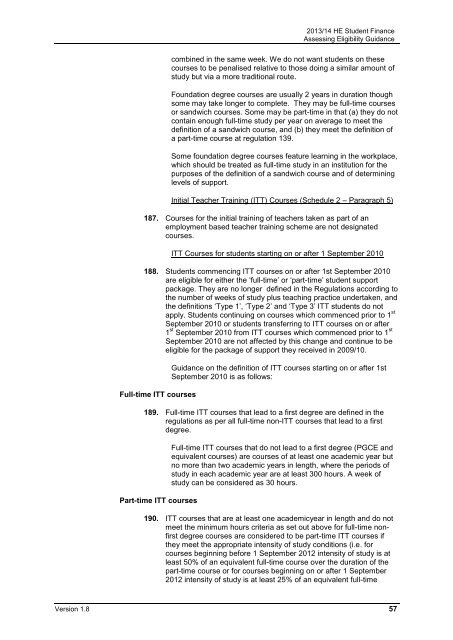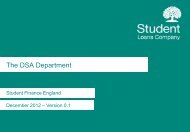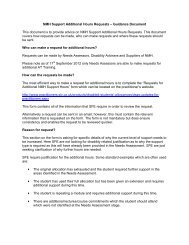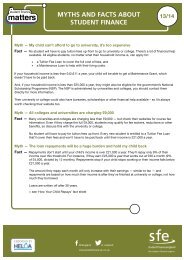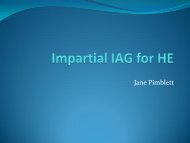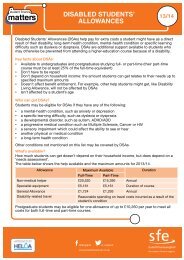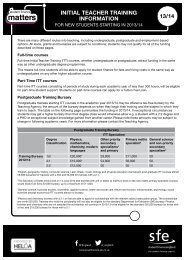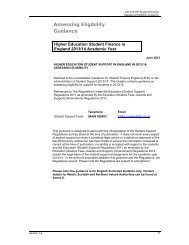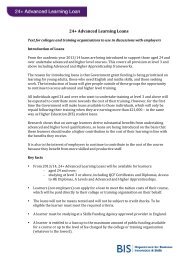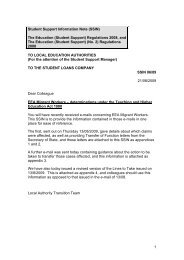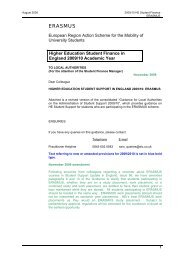SFE Assessing Eligibility Guidance 2013/14 - Practitioners - Student ...
SFE Assessing Eligibility Guidance 2013/14 - Practitioners - Student ...
SFE Assessing Eligibility Guidance 2013/14 - Practitioners - Student ...
You also want an ePaper? Increase the reach of your titles
YUMPU automatically turns print PDFs into web optimized ePapers that Google loves.
<strong>2013</strong>/<strong>14</strong> HE <strong>Student</strong> Finance<br />
<strong>Assessing</strong> <strong>Eligibility</strong> <strong>Guidance</strong><br />
combined in the same week. We do not want students on these<br />
courses to be penalised relative to those doing a similar amount of<br />
study but via a more traditional route.<br />
Foundation degree courses are usually 2 years in duration though<br />
some may take longer to complete. They may be full-time courses<br />
or sandwich courses. Some may be part-time in that (a) they do not<br />
contain enough full-time study per year on average to meet the<br />
definition of a sandwich course, and (b) they meet the definition of<br />
a part-time course at regulation 139.<br />
Some foundation degree courses feature learning in the workplace,<br />
which should be treated as full-time study in an institution for the<br />
purposes of the definition of a sandwich course and of determining<br />
levels of support.<br />
Initial Teacher Training (ITT) Courses (Schedule 2 – Paragraph 5)<br />
187. Courses for the initial training of teachers taken as part of an<br />
employment based teacher training scheme are not designated<br />
courses.<br />
ITT Courses for students starting on or after 1 September 2010<br />
188. <strong>Student</strong>s commencing ITT courses on or after 1st September 2010<br />
are eligible for either the „full-time‟ or „part-time‟ student support<br />
package. They are no longer defined in the Regulations according to<br />
the number of weeks of study plus teaching practice undertaken, and<br />
the definitions „Type 1‟, „Type 2‟ and „Type 3‟ ITT students do not<br />
apply. <strong>Student</strong>s continuing on courses which commenced prior to 1 st<br />
September 2010 or students transferring to ITT courses on or after<br />
1 st September 2010 from ITT courses which commenced prior to 1 st<br />
September 2010 are not affected by this change and continue to be<br />
eligible for the package of support they received in 2009/10.<br />
Full-time ITT courses<br />
<strong>Guidance</strong> on the definition of ITT courses starting on or after 1st<br />
September 2010 is as follows:<br />
189. Full-time ITT courses that lead to a first degree are defined in the<br />
regulations as per all full-time non-ITT courses that lead to a first<br />
degree.<br />
Part-time ITT courses<br />
Full-time ITT courses that do not lead to a first degree (PGCE and<br />
equivalent courses) are courses of at least one academic year but<br />
no more than two academic years in length, where the periods of<br />
study in each academic year are at least 300 hours. A week of<br />
study can be considered as 30 hours.<br />
190. ITT courses that are at least one academicyear in length and do not<br />
meet the minimum hours criteria as set out above for full-time nonfirst<br />
degree courses are considered to be part-time ITT courses if<br />
they meet the appropriate intensity of study conditions (i.e. for<br />
courses beginning before 1 September 2012 intensity of study is at<br />
least 50% of an equivalent full-time course over the duration of the<br />
part-time course or for courses beginning on or after 1 September<br />
2012 intensity of study is at least 25% of an equivalent full-time<br />
Version 1.8 57


